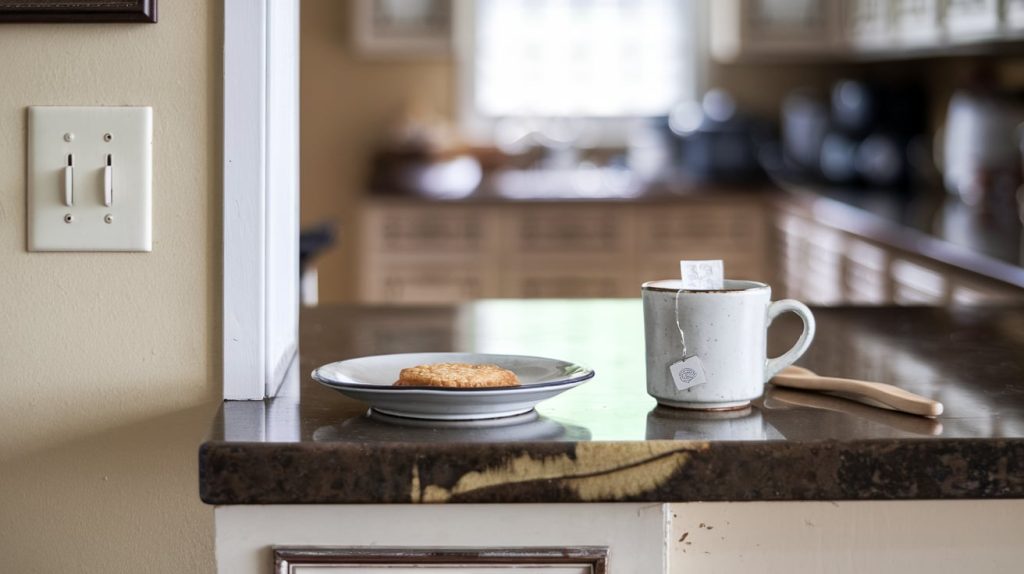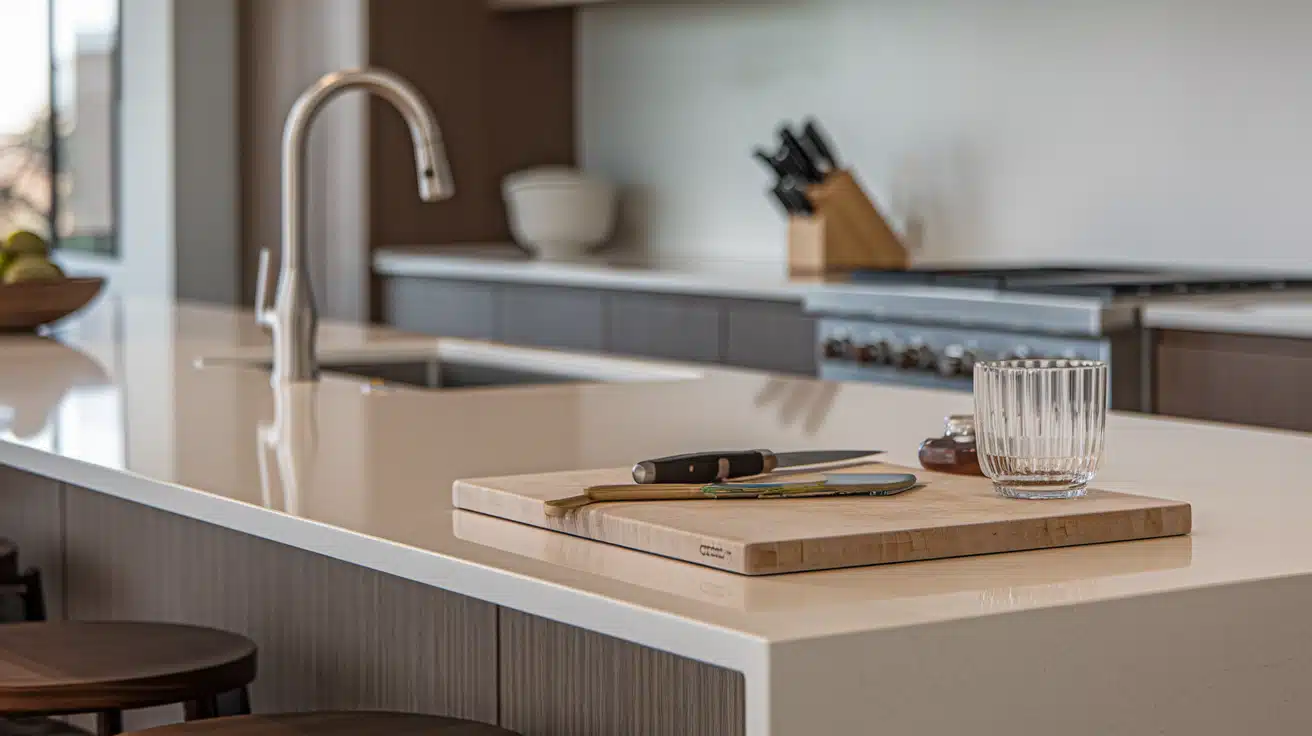I’ve watched countless homeowners stress about sealing their quartz countertops, convinced they need regular maintenance to keep them looking perfect. Here’s what caught my attention: most people don’t realize that quartz countertops are engineered differently than natural stone.
Unlike granite or marble, which need sealing every few years, quartz has a secret that changes everything. The manufacturing process creates a non-porous surface that doesn’t absorb liquids or harbor bacteria.
I want to save you time and money by sharing the truth about quartz maintenance. You’ll learn exactly why sealing quartz is unnecessary and discover the simple care routine that works.
Let me show you why your quartz countertops are already protected and what you should focus on instead.
Why Choose Quartz Countertops?
Thinking about upgrading your kitchen countertops? Quartz might just be the game-changer you’ve been looking for! These engineered stone surfaces are taking over kitchens everywhere, and there are some pretty solid reasons why.
Picture this: you’re cooking dinner, kids are doing homework at the island, and someone spills grape juice. With quartz, you simply wipe it up – no staining, no sealing required.
These countertops are incredibly durable, resisting scratches from daily cooking ventures and heat from hot pans.
Unlike natural stone, quartz doesn’t need annual sealing or special cleaners. It’s basically the low-maintenance friend of countertop materials!
Plus, with endless color and pattern options, you can match any style from modern minimalist to cozy farmhouse.
Ready to learn why homeowners are obsessed with quartz countertops?
Do Quartz Countertops Need Sealing?
Quartz countertops are renowned for their sleek appearance, exceptional durability, and low maintenance requirements. But one common question homeowners ask is whether quartz needs to be sealed like natural stone surfaces.
Why isn’t Sealing Necessary?
Sealing quartz countertops is unnecessary due to their engineered, non-porous surface that naturally repels liquids and stains.
Unlike natural stone, quartz’s manufacturing process creates a sealed barrier that prevents absorption of spills, bacteria, and moisture.
This built-in protection eliminates the need for periodic sealing treatments, making quartz a truly low-maintenance countertop option for homeowners.
Attempting to seal quartz can damage the surface or create an uneven appearance, as the material isn’t designed to accept additional protective coatings.
Why is Sealing Necessary?
While genuine quartz countertops never require sealing, rare exceptions exist for substandard materials or extreme conditions.
Low-grade or fake quartz that shows staining may benefit from sealing, although replacement is preferable.
Outdoor installations exposed to UV rays and freezing temperatures might need specialized sealants.
Commercial laboratories that use strong acids may require chemical-resistant coatings for additional protection against harsh substances.
Pros and Cons of Sealing Quartz Countertops
The truth about sealing quartz might surprise you. There are no real benefits, only drawbacks and wasted money.
| PROS OF SEALING QUARTZ | CONS OF SEALING QUARTZ |
|---|---|
| No actual benefits exist – Quartz surfaces are already engineered to be non-porous and stain-resistant | Unnecessary expense – You’ll waste money on sealers that provide no protection. |
| Marketing claims only – Some companies may suggest benefits that don’t apply to quartz | Wasted time – No benefit from the sealing process since quartz is already protected |
| Peace of mind myth – False sense of extra protection when none is needed | Potential damage – Sealers can create a film on the surface that dulls the finish |
| No maintenance required – Unlike natural stone, quartz needs no sealing schedule | Chemical buildup – Unnecessary products accumulate on your counters over time |
| Already a perfect surface – Manufacturing process creates complete protection from day one | Professional costs – Paying for unneeded services that add no value to your counters |
| Built-in stain resistance – Engineered surface repels liquids without additional treatments | Cloudy appearance – Some sealers can make quartz look dull and reduce natural shine |
Sealing quartz countertops is unnecessary and wasteful since they’re already non-porous by design. Save your money and skip the sealing – your quartz is ready to perform without any additional treatments.
Best Practices for Maintaining Quartz Countertops

Keep your quartz countertops looking brand new with these simple daily habits that take just minutes but make a huge difference.
- Daily Cleaning: Wipe surfaces with warm water and mild dish soap using a soft cloth or microfiber towel for streak-free results.
- Immediate Spill Cleanup: Clean spills promptly to prevent potential staining, even though quartz resists most common household stains effectively.
- Use Cutting Boards: Always use cutting boards when chopping to protect your countertops from knife scratches and preserve their smooth finish.
- Avoid Harsh Chemicals: Skip bleach, ammonia, and abrasive cleaners that can damage the surface or leave unwanted residue on your counters.
- Protect from Heat: Use trivets or hot pads under hot pots and pans to prevent thermal shock that could crack the surface.
- Regular Deep Cleaning: Perform a weekly deep clean using a non-abrasive cleaner specifically designed for quartz to maintain its shine and remove any buildup completely.
- Professional Inspection: Have countertops professionally inspected annually to catch any issues early and maintain your warranty coverage if applicable.
These maintenance practices not only keep your countertops looking pristine but also ensure they continue to provide the durability and low-maintenance benefits that make quartz such a popular choice for modern kitchens and bathrooms.
Final Thoughts
Here’s the bottom line: quartz countertops don’t require sealing for longevity. The engineering process creates a non-porous surface that’s already protected from stains and bacteria.
You can skip the sealing services and expensive products completely.
This matters because you’ll save hundreds of dollars over the years while still having beautiful countertops. Focus your energy on simple daily cleaning with soap and water, rather than unnecessary treatments.
Your quartz countertops are built to last for decades with minimal care. No sealing schedules, no professional maintenance, just regular cleaning and heat protection.
Have you been considering quartz for your kitchen renovation? Do you still have questions about maintenance? Share your thoughts in the comments below. We would love to hear how you made the best choice for your home.
Frequently Asked Questions
How Do You Protect Quartz Countertops?
Daily cleaning with mild soap and water, immediate spill cleanup, using cutting boards for chopping, placing trivets under hot pots, and avoiding harsh chemicals like bleach or abrasive cleaners.
Can You Use Clorox Wipes on Quartz?
No, avoid Clorox wipes on quartz. They contain bleach and harsh chemicals that can damage the surface or leave unwanted residue. Use mild soap and water instead.
Can Magic Eraser Damage Quartz?
Yes, magic erasers can damage quartz countertops. They’re abrasive and can scratch or dull the surface. Use soft cloths or microfiber towels with mild soap instead.
What Should You Not Use to Clean Quartz?
Avoid using bleach, ammonia, abrasive cleaners, Magic Erasers, Clorox wipes, harsh chemicals, scouring pads, and any products containing acids or strong alkaline ingredients on quartz surfaces.








